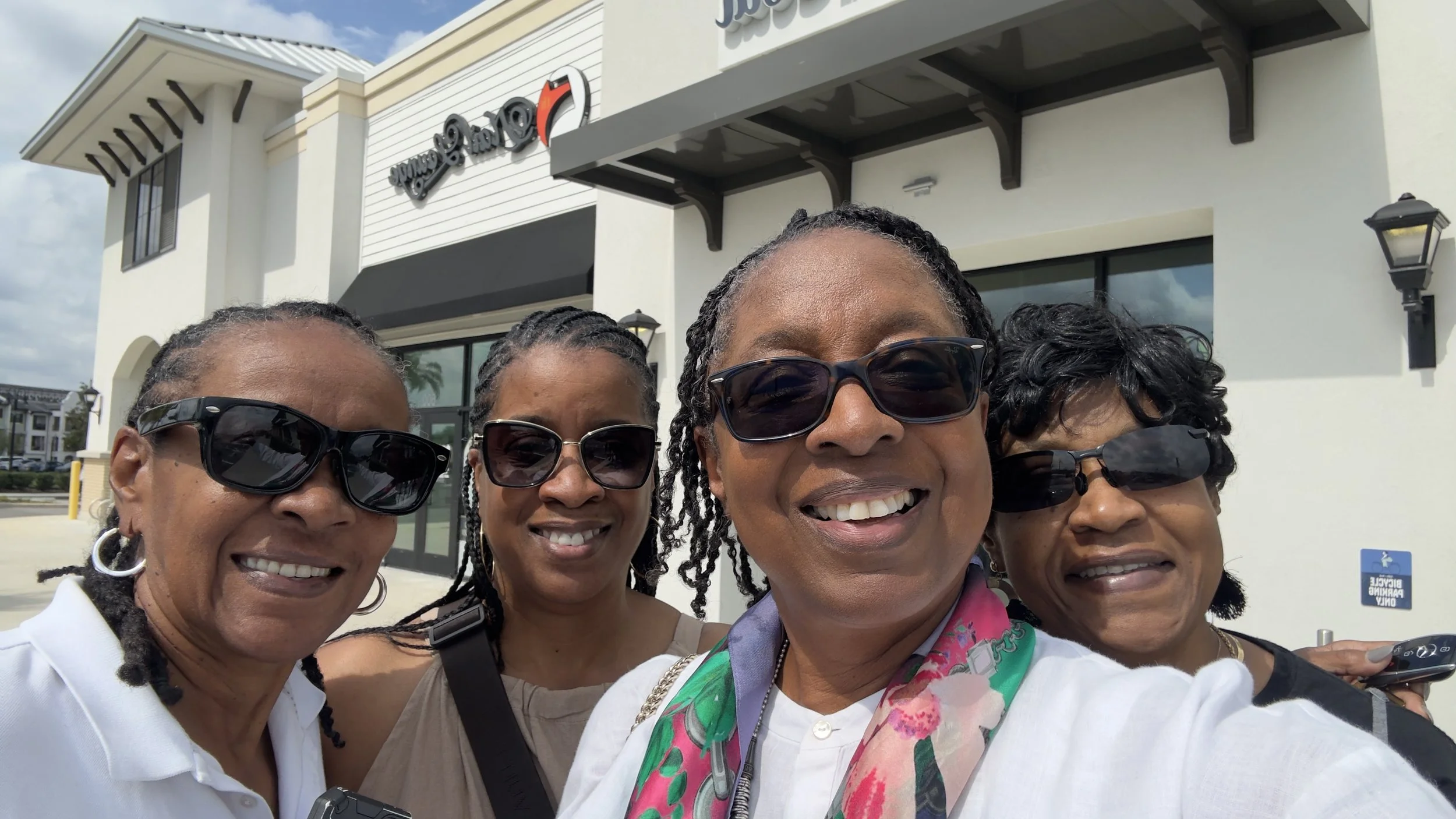Unseen No More
Recognizing Disenfranchised Grief
March 24 was my birthday. 🎂 As we age, we learn to navigate life's complexities. Aging can be a mix of reverence and trepidation. While aging is a natural progression, it comes with unique challenges—particularly in grief—as we face the realizations of hopes, dreams, and expectations we may have had for our former selves. Understanding how aging can lead to disenfranchised grief is essential in fostering empathy and support for older adults during their emotional journeys.
Celebrating #68 with Grace and Gratitude! 🌟
However, I have learned to navigate life's complexities with an open mind, learning and growing from every past and present experience. I embrace my grief, develop resilience, speed walk, travel, write (be on the lookout for new publication announcements coming soon 😊), meet new people, and enjoy all life offers. Embracing aging comes with reverence and trepidation, but you can decide to share the wisdom of grief and aging all along your journey.
I certainly have and will continue as I run this next leg!
What is Disenfranchised Grief?
Understanding the many facets of grief and disenfranchised grief refers to the emotional pain experienced when a person's grief is not openly acknowledged, validated, or supported by society. This phenomenon occurs across various life experiences, including aging and aging-related losses, as women.
Women Disenfranchised Grief
Women are generally more affected by disenfranchised grief compared to men, particularly in specific contexts such as miscarriage, infertility, and caregiving losses. Several factors contribute to this phenomenon:
Social Expectations: Women often bear the emotional weight of relationships and nurturing roles. When they experience a loss, such as the death of a child or a miscarriage, societal expectations may lead to feelings of guilt or shame if their grief is not acknowledged. This can result in their grief being disenfranchised.
Caregiving Roles: Women are predominantly the caregivers in families, and when they face losses related to caregiving—such as the decline or death of an aging parent—they may feel the loss acutely but find that society does not recognize or validate their grief.
Cultural Stigma: In many cultures, there is a stigma associated with certain types of losses that disproportionately affect women, such as pregnancy loss. Women may feel that their grief over these losses is not acceptable or is minimized, leading to disenfranchisement.
Emotional Expression: Women are often socialized to express emotions more openly, which can highlight their experiences of disenfranchised grief when others fail to recognize or support their feelings.
Why Do Older Adults Feel Unseen and Unheard?
An older adult may feel unseen and unheard due to societal attitudes and structures marginalizing their voices. Several factors contribute to this feeling:
Cultural Stereotypes: Negative perceptions of aging can devalue the emotional experiences of older adults, leading to a lack of validation for their feelings of loss.
Isolation: Many older adults live alone or have limited social interactions, which can exacerbate feelings of loneliness during periods of grief. Their needs may go unnoticed in a fast-paced society that often prioritizes youth.
Communication Barriers: Difficulties in expressing emotions, whether due to physical limitations or the societal stigma surrounding discussions of grief among older adults, can result in their feelings being overlooked.
Technology Gap: A lack of familiarity with technology can exclude older adults from modern communication.
Engaging Older Adults' Wisdom and Lived Experience
Despite the challenges, older adults possess invaluable wisdom and life experience that can enrich their communities. As an older adult, I have chosen to continue learning and growing in ways that enhance my life. Every older adult can determine their growth journey based on individual capabilities.
Our villages are essential, whether it's your biological family, adopted family, or friend group.
Three of my four sisters engage regularly. We share life and tell our stories, some full of joy and others sad, but through it all, we celebrate these golden years with one another. I am grateful for each of them as we share our journey!
Here’s how they can engage:
1. Storytelling: Sharing personal stories can foster connections with others, help normalize conversations about grief, and allow older adults to articulate their emotions and experiences.
2. Mentorship: Older individuals can mentor younger generations, offering guidance based on their lived experiences, including how they have navigated loss and grief.
3. Community Involvement: Engaging in community activities through volunteer work or group discussions can allow older adults to express themselves and feel valued for their contributions.
The reality for me was recognizing that the presence of disenfranchised grief among older adults is essential for validating emotional experiences. This awareness provides ways to expand and support the aging and enhance my mental wellness along the way. Knowing this simple truth, when we do for others, we also reap many benefits.
Some ways to engage include the following:
1. Listen Actively: Create a compassionate and non-judgmental space where older adults feel comfortable sharing their feelings of loss.
2. Validate Their Emotions: Acknowledge that their grief surrounding aging and loss is accurate and deserving of recognition.
3. Challenge Stereotypes: Work to dismantle negative perceptions about aging within communities, fostering a more empathetic understanding of the needs and emotions of older adults.
4. Encourage Open Conversations: Allow for discussions about aging and the associated grief, helping to break the silence often surrounding these topics.
What Can Older Adults Do When Faced with Grief and Aging?
Owning and being responsible for my mental and physical health became a critical part of aging for me. Navigating these challenges of grief and aging can be difficult for older adults, but embracing new opportunities can lead to profound benefits. Learning a new thing or engaging in community exercising presents a wealth of advantages that can transform this phase of life into a fulfilling journey. Here are some key benefits for you to consider:
Cognitive Engagement: Acquiring new skills is a powerful exercise for the brain, enhancing mental function and potentially reducing the risk of cognitive decline and dementia.
Physical Health: Incorporating new exercises into a daily routine improves physical fitness. It enhances strength, balance, and flexibility, promotes cardiovascular health, and helps manage weight, ultimately reducing the risk of chronic diseases.
Social Interaction: Enrolling in group classes or training programs provides valuable opportunities for social connections. These interactions can combat loneliness and foster community, which is vital for emotional well-being.
Increased Confidence: Mastering a new skill can significantly boost self-esteem and confidence, leading to greater achievement and independence.
Adaptability: Engaging in new trades or exercises helps develop adaptability and resilience, equipping older adults with the flexibility to navigate life’s inevitable changes and challenges.
Purpose and Fulfillment: New activities offer a renewed sense of purpose, enhancing overall satisfaction and happiness. This sense of accomplishment can be a powerful antidote to feelings of grief.
Improved Mobility: Tailored exercises can enhance coordination, balance, and mobility, significantly reducing the risk of falls and injuries—common concerns for older adults.
Stress Relief: Physical activities and continuous learning effectively relieve stress, improve mood, and promote better mental health.
While facing grief and the complexities of aging may present obstacles, leaning into the benefits of learning and exercise can significantly enhance the quality of life for older adults, making each challenge a step toward personal growth and fulfillment.
Validating Grief in Aging
Aging encompasses a range of losses that can lead to disenfranchised grief. By embracing an understanding of the emotional journeys faced by older adults, we can cultivate a more supportive and compassionate environment. We must honor and validate every experience of grief, recognizing that all emotional journeys, regardless of age, deserve acknowledgment and understanding.
Let’s work together to be seen, heard, and supported as older adults experiencing disenfranchised grief and aging, sharing our wisdom, and telling our stories.
Thank you for meeting me here!
Anna Laura!
#Aging #DisenfranchisedGrief #GriefAwareness #EmotionalWellness #SupportOlderAdults #Compassion #YouAreNotAlone #ElderCare #MentalHealthMatters #WisdomOfAging #AgingGracefully #ActiveSeniors #Resilience #SeniorVoices #CoachAnna #CoachingProfessional
“All That You Touch You Change
All That You Change Changes You”
—Octavia E. Butler
Whale Bay, Bermuda March 2025
References:
National Institute on Aging. (n.d.). Social Isolation and Loneliness in Older Adults: A Core Component of Person-Centered Care. [Link]
National Coalition for the Homeless. (2021). Homelessness Among Older Adults. [Link]
A study published in the Journal of Social Work in End-of-Life & Palliative Care highlights that women are more likely to face disenfranchised grief due to societal and familial dynamics that affect their ability to mourn openly (Lund et al., 2010).
Additionally, Kenneth Doka, a prominent researcher in the field of grief and loss, discusses how disenfranchised grief often disproportionately impacts women, especially in contexts of loss related to motherhood and caregiving, in his work, Disenfranchised Grief: Recognizing Hidden Sorrow.




